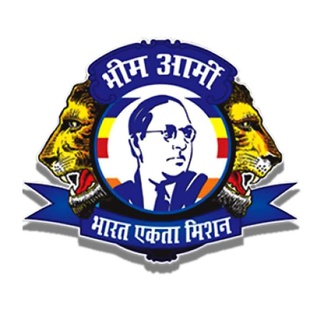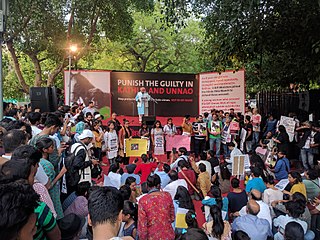
Yogi Adityanath is an Indian Hindu monk and politician from the Bharatiya Janata Party who has been serving as the 21st and current chief minister of Uttar Pradesh since 19 March 2017. He is the longest serving chief minister of Uttar Pradesh, who is currently running his tenure for over six years, surpassing Sampurnanand.
The Rampur Tiraha firing case refers to police firing on unarmed Uttarakhand statehood activists at Rampur Tiraha (crossing) in Muzaffarnagar district in Uttar Pradesh in India on the night of 2 October 1994.

The Uttar Pradesh Police, is the primary law enforcement agency within the Uttar Pradesh state of India. Established in 1863 as the Office of the Inspector General of Police, United Provinces under the Police Act, 1861. It is headed by Director General of Police (DGP).
Ram Sanehi Ghat is a city in Barabanki district in the state of Uttar Pradesh, India. It is a Tehsil and Police station(Thana).
The Hashimpura massacre was the killing of 75 Muslim men by police on or around 22 May 1987 near Meerut in Uttar Pradesh state, India, during the 1987 Meerut communal riots. It was reported that 19 personnel of the Provincial Armed Constabulary rounded up 42 Muslim youths from the Hashimpura mohalla (locality) of the city, took them to the outskirts of the city, shot them in cold blood and dumped their bodies in a nearby irrigation canal. A few days later, the dead bodies were found floating in the canal and a case of murder was registered. Eventually, 19 men were accused of having performed the act. In May 2000, 16 of the 19 accused surrendered and were later released on bail. Whereas, the other three accused died in the intervening period. In 2002, the Supreme Court of India ordered that the case trial should be transferred from the Ghaziabad district court to a Sessions Court at the Tis Hazari court complex in Delhi.

The Criminal Law (Amendment) Act, 2013 is an Indian legislation passed by the Lok Sabha on 19 March 2013, and by the Rajya Sabha on 21 March 2013, which provides for amendment of Indian Penal Code, Indian Evidence Act, and Code of Criminal Procedure, 1973 on laws related to sexual offences. The Bill received Presidential assent on 2 April 2013 and was deemed to be effective from 3 February 2013. It was originally an Ordinance promulgated by the President of India, Pranab Mukherjee, on 3 February 2013, in light of the protests in the 2012 Delhi gang rape case.

Kunwar Bharatendra Singh is an Indian politician. He was a member of Uttar Pradesh Legislative Assembly elected from Bijnor as a candidate of Bharatiya Janata Party. He lost 2019 Lok Sabha election from Bijnor Lok Sabha constituency. Kunwar Bhartendra Singh belongs to Jat community . He has been in news and controversies as an accused in the Muzaffarnagar riots. He was also issued notice by the Allahabad High Court on an election petition filed by one Rajendra Kumar.

Prafulla Chandra Pant is an Indian judge and author who served as a judge of the Supreme Court of India from 2014 to 2017. He later served as a member of the National Human Rights Commission of India from 2019 to 2021, and briefly acted as its chairperson. Prior to his appointment as a judge of the Supreme Court of India, he had previously served as chief justice of the Meghalaya High Court at Shillong and as a judge of the Uttarakhand High Court at Nainital.

The Bhim Army, alternatively Bheem Army or the Bheem Army Bharat Ekta Mission is an Ambedkarite and Dalit rights organisation in India. It was founded by Satish Kumar, Vinay Ratan Singh and Chandra Shekhar Aazad in 2015. The organisation runs more than 350 free schools for Dalits and Bahujans in the districts of Saharanpur, Meerut, Shamli and Muzaffarnagar in western Uttar Pradesh. The organisation is named after B. R. Ambedkar.
In early April 2018, thousands of people belonging to Scheduled Castes and Scheduled Tribes (SC/ST) protested across India against an order of the Supreme Court on the dilution of Atrocities Act. In subsequent violence, 14 dalit people died and hundreds were injured.

The Unnao rape case refers to the gang rape of a 17-year-old girl on 4 June 2017 in Unnao, Uttar Pradesh, India. On 16 December 2019, former BJP MLA Kuldeep Singh Sengar was convicted for the rape on 20 December 2019 and sentenced to life imprisonment. Further, Sengar was found guilty in the death of the girl's father in judicial custody.
Kafeel Khan is an Indian doctor, author and former lecturer at the Department of Paediatrics, Baba Raghav Das Medical College, Gorakhpur, Uttar Pradesh, India.

The Citizenship Amendment Act (Bill) protests, also known as the CAA Protest, CAB Protest or CAA and NRC protests, occurred after the Citizenship Amendment Act (CAA) was enacted by the Government of India on 12 December 2019. The move sparked a widespread national and overseas ongoing protests against the act and its associated proposals of the National Register of Citizens (NRC). The protests first began in Assam and spread swiftly in other states such as Delhi, Meghalaya, Arunachal Pradesh, and Tripura on 4 December 2019. Protests broke out rapidly across the country, although the concerns of the protesters vary.

The 2020 Delhi riots, or North East Delhi riots, were multiple waves of bloodshed, property destruction, and rioting in North East Delhi, beginning on 23 February 2020 and brought about chiefly by Hindu mobs attacking Muslims. Of the 53 people killed, two-thirds were Muslims who were shot, slashed with repeated blows, or set on fire. The dead also included over a dozen Hindus, who were shot or assaulted. More than a week after the violence had ended, hundreds of wounded were languishing in inadequately staffed medical facilities and corpses were being found in open drains. By mid-March many Muslims had remained missing.
CAA protests in Uttar Pradesh was a protest that began in response to the passage of the Citizenship (Amendment) Act (CAA) in both houses of Parliament on 11 December 2019. and the police intervention against students at Jamia Millia Islamia who were opposing law which gives priority to Hindus, Sikhs, Buddhists, Jains, Parsis and Christians resident in India before 2014, but excludes Muslims, including minority sects. The student activists were also demanding complete roll back of CAA.
COVID-19 Pandemic spread to Uttar Pradesh in March 2020. While the World Health Organization praised the UP government for its contact tracing efforts, there were several other issues in its management of the pandemic, including under reportage of cases by the government, vaccine shortages and dismal conditions of COVID-19 hospitals.
Stone pelting in India refers to criminal assault in the form of stone throwing by individuals or mob who pelt, bombard or throw stones at security personnel, police forces, healthcare workers and trains. Stone pelting began with incidents of stone pelting in Kashmir, but became less frequent after the revocation of article 370 of the Constitution of India and the conversion of the state into union territories. These incidents were later reported in Delhi and Uttar Pradesh in 2019 in protest of the citizenship amendment act. In 2020, such incidents started occurring in various parts of India on doctors and policemen after the coronavirus lockdown.

On the night of 11 August and the early hours of 12 August 2020, violent clashes took place around the residence of a legislator and the police stations of KG Halli and DJ Halli of the Indian city of Bangalore, Karnataka. A group of Muslims, angered by a Facebook post on Muhammad allegedly shared by Akhanda Srinivas Murthy's nephew, a state legislator of the Indian National Congress, arrived at his house in protest, which later turned violent..

The Uttar Pradesh Prohibition of Unlawful Religious Conversion Ordinance, 2020, referred to as the Love Jihad law by most of the media, is an anti-conversion law enacted by the Government of Uttar Pradesh, India. The Uttar Pradesh state cabinet cleared the ordinance on 24 November 2020 following which it was approved and signed by state Governor Anandiben Patel on 28 November 2020.
The bulldozer found its way into the election and political lexicon of Uttar Pradesh and further across India after its massive political use by UP chief minister Yogi Adityanath of the BJP. While bulldozers are routinely used across India to remove illegal constructions, the bulldozer in this case has been used as an extrajudicial tool and a power statement against criminals, communal violence rioters and accused criminals. Following its usage in political messaging in Uttar Pradesh, the bulldozer was used in Madhya Pradesh to convey political messages aimed at showing a strong stance against criminals. Narratives conveyed that a lot of the usage of the bulldozer was itself communal in nature. Critics argue that giving up on the rule of law and adopting "bulldozer justice" is the initial move toward an authoritarian society. In such a society, the safety, life, and liberty of individuals would depend on the arbitrary decisions of state officials.











